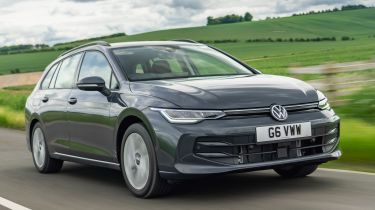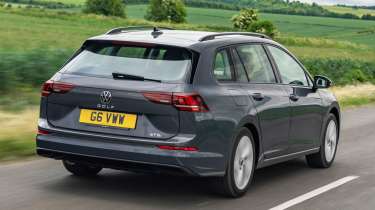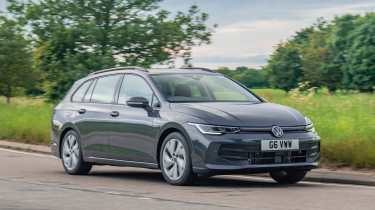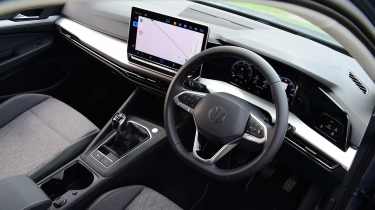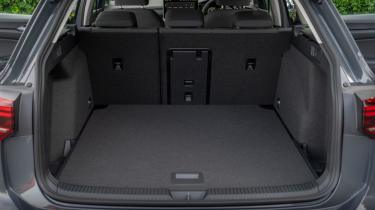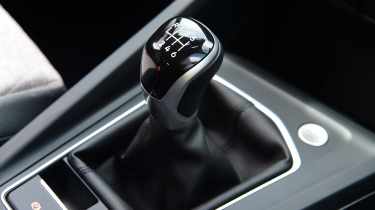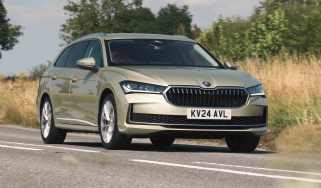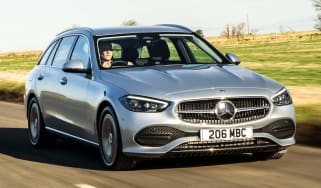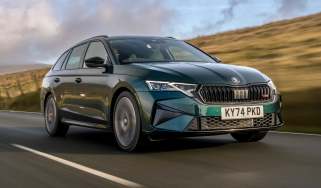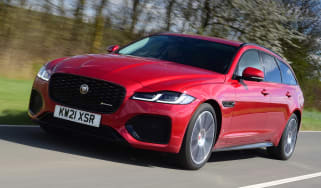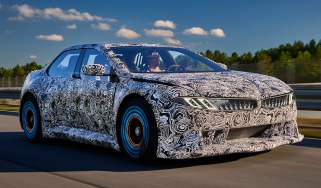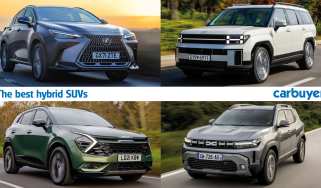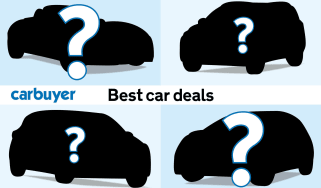Volkswagen Golf Estate review - a refined and frugal load-lugger
"The Volkswagen Golf Estate is sophisticated and practical but some cheaper models offer even more space"
Pros
- Spacious interior
- Good to drive
- Standard equipment
Cons
- Cheaper rivals
- No plug-in hybrid yet
- Ford Focus is more fun
Verdict - Is the Volkswagen Golf Estate a good car?
More practical than ever, refined and comfortable for passengers, the latest Golf Estate shouldn't be overlooked if you are looking for an estate car. Some of the frustrations of the new Golf’s interior have been improved by the facelifted version, but the estate version still can't match the boot volume of the less expensive Skoda Octavia Estate. It’s also a shame the plug-in hybrid setup from the hatch hasn’t made it to the load-lugger, but on the plus side, both its petrol and diesel engines are efficient, smooth and refined.
Volkswagen Golf Estate models, specs and alternatives
Offering affordable running costs, reasonable performance and a desirable image, models like the Volkswagen Golf Estate remain popular with buyers. We think the post-facelift Mk8.5 is the most compelling version of the Golf so far, thanks to its improved interior space and more comfortable ride.
Measuring 67mm longer than the hatchback, VW’s rival to the Ford Focus Estate and Skoda Octavia Estate gets more legroom than the Golf hatchback, along with 611 litres of boot space behind the rear seats. That can't quite match the boxy Skoda but beats the Ford by just over 20 litres. The space itself is a useful shape too – flat and with a low loading lip to slide heavy items over and an adjustable floor height.
Engines include a 1.5-litre TSI petrol, with mild-hybrid technology available on automatic versions to help boost efficiency. This engine can return around 50mpg, and we think it’s the sweet spot in the range; it’s quiet, affordable and has enough pulling power for heavy loads. A brace of 2.0-litre diesel engines are also available, which suit high-mileage drivers and those planning on towing. Volkswagen previously offered a Golf Estate Alltrack, which boasts some genuine off-road ability, but it’s since been discontinued.
More reviews
Car trim reviews
In-depth reviews
- Volkswagen Golf review - the go-to family hatchback
- Volkswagen Golf R review – the ultimate Golf
- Volkswagen Golf R estate review
Used car reviews
The interior looks smart and modern thanks to its digital dashboard, with displays for the instruments and infotainment setup, but some arrivals like touch-sensitive sliders for the volume control feel like a step backwards versus physical dials, because they are more fiddly to use – even after the facelift added backlighting and upped their sensitivity. Trims are Life, Style and R-Line, with the last on the list offering a sporty look inspired by the high-performance Golf Estate R. Every version is fairly well equipped as standard, getting alloy wheels and even ambient interior lighting.
Handling is as assured as you'd expect for a car wearing the Golf badge, without quite matching the sense of precision you get in the Focus Estate. The 1.5-litre petrol will be just as smooth and accomplished as it is in the hatchback, while the 2.0-litre TDI with 113bhp feels more able than you may expect, thanks to its plentiful pulling power and a smooth six-speed manual gearbox.
MPG, running costs & CO2
Petrol engines have overtaken the popularity of diesels in this generation of Golf Estate, and the 1.5-litre TSI can just top 50mpg, with either a manual or DSG automatic gearbox. Even the 1.5-litre with 148bhp manages to crack the milestone, returning up to 51.4mpg with a six-speed manual. With mild-hybrid tech added – providing engine-off coasting and extended stop and start in traffic – the eTSI version manages up to 53.3mpg and emissions from 120g/km.
Volkswagen has also continued to develop its 2.0-litre TDI diesel engine, which now gets 'twin dosing' of AdBlue emissions-reducing fluid to make it as clean as possible. The lower-powered version can return up to 64.2mpg and emits from 115g/km in the Estate, dropping to 58.9mpg for the 148bhp automatic. This could make it appealing for high-mileage drivers but considering the petrol can hit 50mpg, most won't find the greater expense worthwhile. The Golf Estate Alltrack was only offered with the most powerful version of the 2.0-litre diesel engine, four-wheel drive and an automatic gearbox, so efficiency was hampered somewhat. Still, 50.4mpg and 147g/km of CO2 still bettered many mid-size SUVs.
There’s still no sign of a plug-in hybrid version of the Golf Estate, sadly. This technology gives the Golf plug-in hybrid hatchback an EV range of up to 89 miles, for CO2 emissions from just 6g/km.
Golf parts should be widely available and fairly reasonable, although Volkswagen servicing isn't necessarily the cheapest. Insurance groups are likely to stick close to the hatchback, starting from around group 14 and reaching the mid-twenties for 2.0-litre diesel versions.
Engines, drive & performance
It might be longer and slightly heavier than the hatchback but the Golf Estate feels similar from behind the wheel. Its steering conveys the same sense of assured body control and unflappable handling Golf owners have come to expect. It doesn't have quite the same level of feel and agility as the Ford Focus Estate, but for most buyers that's unlikely to be a big deal.
It’s worth noting that lower-powered cars like the entry-level diesel get a simpler rear suspension design, but we didn’t find this much of an issue. While not quite as eager or sporty, more affordable Golfs still feel comfortable and composed, without too much body lean.
The 2.0-litre TDI diesel probably makes more sense here too because most Estate owners will be expected to lug heavy loads and are more likely to tow a trailer too. Even with just 113bhp, the diesel has plenty of power at low revs, and its 0-62mph acceleration time of 10.5 seconds is respectable. It has a six-speed manual gearbox with a positive shift action, and a seven-speed DSG automatic is also offered for around a £1,500 premium. We found the entry-level diesel a pleasant surprise, with decent refinement once on the move, and enough pulling power to accelerate without having to constantly swap gears. Upgrade to the 148bhp diesel and the 0-62mph time drops to 9.1 seconds.
When it was available in Life trim, the 1.0-litre TSI petrol engine could struggle if you loaded up the Estate's boot, but this engine has now been replaced by the 1.5-litre. The 1.5-litre eTSI automatic with 114bhp or 148bhp is likely to be a better bet, and they both give the Estate a reasonable turn of speed, getting from 0-62mph in 10.3 and 8.6 seconds respectively.
For those who live off the beaten track, but don’t necessarily want an SUV, VW also offered the Volkswagen Golf Alltrack for a time in the pre-facelift version. This has raised suspension to improve its ground clearance by 15mm, so it’s more than capable of traversing grassy car parks or dirt tracks. It also came with VW’s 4MOTION four-wheel drive system as standard, which acts like a front-wheel drive car most of the time, but sends power to the rear wheels if it senses a loss of traction.
The Golf Alltrack also has the same 198bhp 2.0-litre diesel engine as the Golf GTD, so allied with a fairly snappy DSG automatic gearbox, it can get from 0-62mph in a brisk 7.1 seconds. We found this felt rather punchy, and despite its off-road ability, the Alltrack doesn’t feel much different than a regular Golf Estate in the corners. It’s also pretty comfortable, with the raised suspension helping to soak up bumps.
Interior & comfort
The Mk8 Golf's interior has been praised and criticised; it has much of the latest technology but some of it isn’t as easy to use as you’d hope – an area Volkswagen tried to tackle with the ‘Mk8.5’ facelift in mid-2024. We weren’t fans of the slider controls for the climate control just under the touchscreen, for instance, and while this is now backlit to make it easier to see at night, we’d still prefer physical dials like those found in some of the latest Skoda models. We also found the infotainment had rather confusing menus, and VW has done a better job here, upgrading to a 12.9-inch touchscreen with extra shortcuts to get to your favourite settings more quickly.
A longer wheelbase has improved the Golf's ride quality slightly, however, and the interior feels spacious. There's also lots of adjustment for both the driver's seat and steering wheel, making it possible for almost anyone to get comfortable enough for a lengthy drive.
Trim levels are Life, Style and R-Line. Even the entry-level version gets some impressive kit, including adaptive cruise control, 10-colour ambient lighting and 16-inch alloy wheels. Style adds three-zone climate control, 30-colour lighting, upgraded LED Plus headlights, 17-inch alloys and different interior trim, while R-Line gets a more sporting exterior and interior makeover. When available, Alltrack models got a unique 17-inch alloy wheel design, illuminated grille, tinted windows, driving profile selector and a heated steering wheel.
While quite a few optional extras add unnecessary cost – we’d avoid upgrading to larger alloy wheels for instance – the panoramic sunroof and IQ Light LED matrix headlights are worth considering for the benefits they bring to the overall ownership experience.
Practicality & boot space
To earn its stripes, the Golf Estate has to be able to carry more than a similarly priced SUV, as well as being refined and easy to live with. To this end, the Estate is 67mm longer than a Golf hatchback, not only giving it a bigger boot, but also freeing up an additional 38mm of legroom for passengers.
The boot measures 611 litres with the rear seats in position, making it six litres bigger than the outgoing car. Lower the seats and there's now 1,655 litres of cargo room – a more impressive improvement of over 20 litres. It's a flat load space too, making it easy to slide heavy or bulky objects inside without them getting snagged. This is partly thanks to the variable-height floor, which smooths out the ridge you often get when the back seats are folded down. Its size puts it ahead of the Ford Focus Estate and Vauxhall Astra Sports Tourer, but it still can't quite match the Skoda Octavia Estate, which is 30 litres bigger with the seats in place.
If you plan on towing with your Golf Estate, the petrol versions can tow from 1,300kg to 1,500kg with the 148bhp version, while the diesel engine can haul a braked trailer from 1,500 to 1,600kg in weight.
Reliability & safety
It might be called the Mk8 Golf, but in reality this is still an evolution from the Mk7, so we don't expect reliability to change too drastically. Safety should also be improved, thanks to the latest technology innovations.
The Mk8 Golf came 50th out of the top 50 cars in our 2024 Driver Power survey, and a last place for user-friendliness of its infotainment are a clear sign owners also feel VW has taken a backwards step here. Hopefully the facelift will go some way to boosting these scores via its improved software. Perhaps even more worrying is the Golf’s poor showing in areas like value, along with quality and reliability, where it also came bottom of the table.
While it's unlikely the Golf Estate itself will be crash-tested, the Golf hatch has already been awarded a five-star result by Euro NCAP. It has a plethora of equipment to help avoid collisions, as well as keeping occupants safe should the worst happen. Features include lane keeping assist and Car2X communications that can share data with other vehicles in the area and warn of hazards on the route.
Which Is Best?
Cheapest
- Name1.5 TSI Life 5dr
- Gearbox typeManual
- RRP£29,195
Most Economical
- Name1.5 TSI Life 5dr
- Gearbox typeManual
- RRP£29,195
Fastest
- Name2.0 TSI 333 R 4Motion 5dr DSG
- Gearbox typeSemi-auto
- RRP£45,970
